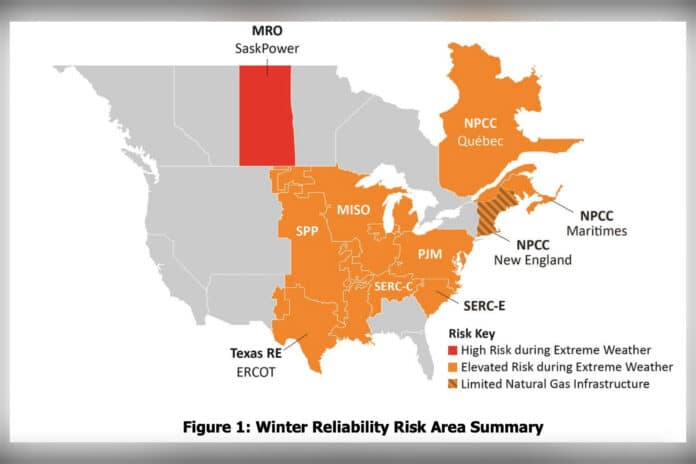
(Daily Caller News Foundation) — A huge portion of the U.S. faces elevated risk of power shortages this coming winter, according to a new report published by the North American Electric Reliability Corporation (NERC), a power grid watchdog.
Nearly all of the country’s residents living in the Midwest and the East Coast face elevated risks of blackouts and shortages in the event of colder-than-usual winter conditions, excluding New York state and the warmer Southeast region, according to the NERC report. An extended cold snap could disrupt natural gas-related generation and transportation enough to create electricity shortages as utility customers crank up their thermostats to stay warm.
“Recent extreme cold weather events have shown that energy delivery disruptions can have devastating consequences for electric and natural gas consumers in impacted areas,” the report warns, referencing the toll that Winter Storm Elliot exacted in December 2022. The areas highlighted in the NERC report are home to approximately 180 million Americans, well over half of the country’s population.
NERC’s 2023–2024 WRA finds much of North America is at an elevated risk of insufficient energy supply to meet demand in extreme conditions. Areas identified as being at elevated risk extend over the eastern two-thirds of the continent: https://t.co/e0yXQTYlBU #reliabilityweek pic.twitter.com/p7gEaZMj7V
— NERC (@NERC_Official) November 8, 2023
Other risks identified include demand forecasting and the potential strain that an extended period of colder-than-usual winter weather could have on the availability of other key fuel supplies, according to the report’s text.
An unusually severe winter storm in 2021 led to blackouts in Texas as wind turbines and natural gas facilities failed to meet elevated demand, creating an acute crisis that resulted in at least 245 deaths.

NERC’s last report, issued in May ahead of the summer season, similarly warned that huge swaths of the country faced elevated blackout risks in the event of extended heat waves. Texas narrowly avoided shortages in September, which David Blackmon, a Texan and energy industry expert, attributed to the intermittent nature of the wind and solar generation the state’s grid relies on during a heat wave.
Neither the White House nor the Federal Electric Reliability Corporation responded immediately to requests for comment.
















